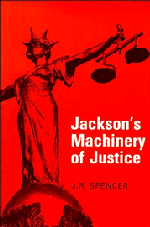Book contents
- Frontmatter
- Contents
- Acknowledgements
- List of figures
- List of tables
- Preface
- Preface to the first edition of ‘The Machinery of Justice in England’
- Abbreviations
- I Historical introduction
- 1 The courts
- 2 The common law
- 3 Trial at common law
- II Civil jurisdiction
- III Tribunals
- IV Criminal jurisdiction
- V The personnel of the law
- VI The European dimension
- VII The cost of the law
- VIII Law Reform
- Appendix A The Report of the Civil Justice Review
- Table of Cases cited
- Table of Statutes cited
- Table of Stationery Office publications cited
- Index
3 - Trial at common law
Published online by Cambridge University Press: 10 January 2011
- Frontmatter
- Contents
- Acknowledgements
- List of figures
- List of tables
- Preface
- Preface to the first edition of ‘The Machinery of Justice in England’
- Abbreviations
- I Historical introduction
- 1 The courts
- 2 The common law
- 3 Trial at common law
- II Civil jurisdiction
- III Tribunals
- IV Criminal jurisdiction
- V The personnel of the law
- VI The European dimension
- VII The cost of the law
- VIII Law Reform
- Appendix A The Report of the Civil Justice Review
- Table of Cases cited
- Table of Statutes cited
- Table of Stationery Office publications cited
- Index
Summary
It is generally accepted that there have been two main systems of trial in civilised law, the accusatorial and the inquisitorial. At the time of the foundation of our legal system in the twelfth and thirteenth centuries, common law procedure was accusatorial; the parties came before the court upon an equal footing and the court gave no help to either of them. It was the duty of one party to formulate his grievance and the duty of the other party to deny it. The mode of trial was some type of ordeal, which was judicium dei: the judgment was that of God, not that of the president of the court. A dislike of such proceedings was manifested by the Church. When, for instance, it was alleged that a priest was not conducting himself properly the ecclesiastical superiors showed little enthusiasm for a trial by judicium dei; the twelfth-century technique was to send a trusted person along to inquire into the allegations. This founded the inquisitorial concept of a trial, whereby the judge was expected to find out for himself what had happened, and he was to do this by examining all persons, including the accused or suspected person, who might have been able to enlighten him. In the thirteenth century the inquisitorial system represented the cause of progress and eventually became the accepted theory on the Continent.
- Type
- Chapter
- Information
- Jackson's Machinery of Justice , pp. 19 - 24Publisher: Cambridge University PressPrint publication year: 1989

